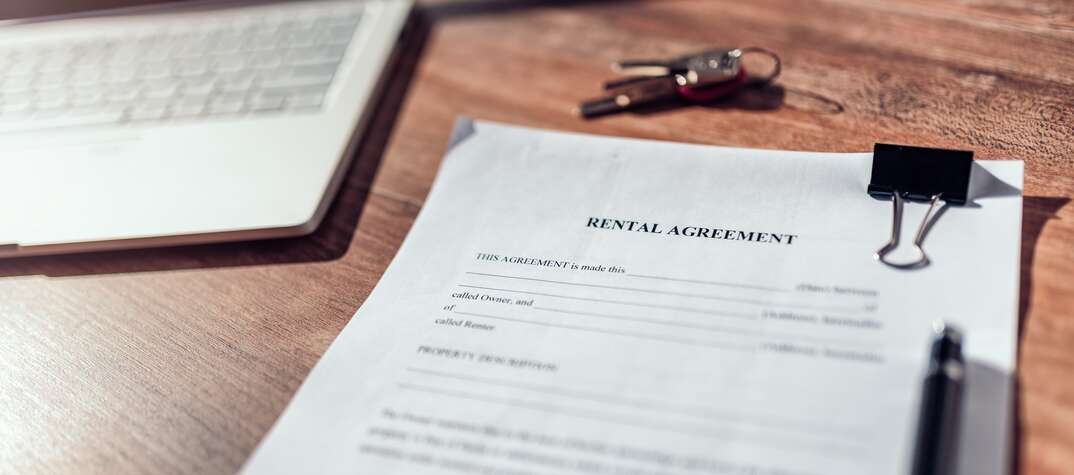- AppliancesElectriciansHVACLandscapingLocksmithPest ControlPlumbingRenovationRoofingT V RepairAll Home Improvement
- Car AccidentClass ActionCorporate LawCriminal DefenseDivorce LawEmployment LawFamily LawFinancial LawLegal AidMedical Injury LawyersMedical MalpracticeReal Estate LawWater Fire RestorationAll Legal
- InvestmentRetirementAll Finance
- Animal InsuranceAutoGeneral InsuranceHealth PolicyHome RentersAll Insurance
- DentalHealth SpecialistsAll Medical
- Animal CareVeterinaryAll Pets
- Auto GlassTowingAll Automotive
Can My Landlord Refuse to Return a Security Deposit?

Moving is expensive, from the cost of a moving truck to new furnishings to cleaning supplies. And moving into a new apartment or rental house often requires payment of a security deposit.
However, unlike other costs, you may be expecting to get your security deposit funds back when you move out. So what happens if your landlord refuses to return your deposit?
Generally, security deposits are refundable when you move out, but this can depend on the terms of your lease and the laws of the city and state where you live.
Your landlord may be able to withhold some or all of the deposit for damage or unpaid bills. The following aren't security deposits and usually aren't refundable:
- Application fees
- First and last month's rent paid at lease signing
- Pet deposits or professional cleaning fees required by a lease
How Long Can a Landlord Hold a Security Deposit?
Landlords can hold security deposits as long as you live in their rental and for a short time after you move out. Your landlord may need a mailing address where they can send your refund.
The precise length of time the deposit may be held after move-out depends on the lease and the property's location. For example, in Texas, landlords must send the refundable portion of your deposit within 30 days of move-out. Colorado allows landlords up to 60 days to return the deposit, but only if the lease agreement specifies the longer period.
As with most landlord-tenant laws, permitted deductions depend on the lease terms and laws of the relevant jurisdiction. However, the following types of deductions are often allowed.
Damage Beyond Normal Wear and Tear
Landlords usually can't charge you for damage simply from living in a home, such as slightly worn carpets. However, heavily stained carpet, large holes in the walls or damaged window coverings typically go beyond normal wear and tear. A landlord can deduct reasonable repair costs for damage caused by a tenant or guests.
In many cases, the landlord can't charge you for damage caused by weather, structural issues or other things beyond your control. However, you may be on the hook if your negligence contributed to the damage.
Cleaning Fees
Your lease may state that you can't have pets in the unit or that smoking is prohibited. If you allow prohibited animals or activities in your rental home, the landlord is likely entitled to deduct cleaning fees from your deposit.
Typically, leases require tenants to leave a unit reasonably clean and may require a professional carpet cleaning or other service. If you fail to clean the rental as required, the landlord may be able to deduct cleaning fees.
Unpaid Utility Bills
Some utilities, such as water and electricity, are linked to a property or address. Failure to pay these bills can create problems for the landlord or future tenants. If you don't pay these bills, the landlord may take the amounts out of your deposit.
Unpaid Rent
A landlord may be able to retain a security deposit to cover unpaid rent. However, don't assume you can use the security deposit to pay your rent, because many leases don't allow this.
More Related Articles:
- When Do You Need a Lawyer? Determine If You Need to Hire an Attorney
- What Is a Class-Action Lawsuit?
- What Is a Misdemeanor?
- What to Do After a Car Accident
- What Is Power of Attorney?
What Do You Do If the Landlord Doesn't Return the Deposit?
If the deadline to return the deposit passes, contact your landlord to demand your deposit money. Check laws for your city and state to ensure your demand meets legal requirements. For example, you may need to include the following information:
- The amount of the deposit
- The date you moved out
- A mailing address where you'd like the refund sent
You should almost always make this demand in writing. A written record lets you take additional legal action if the landlord doesn't return your deposit.
If the landlord kept some or all of your deposit for illegitimate reasons, check local laws and communicate with the landlord in writing. You may need to send a letter disputing the deductions and providing evidence, such as photos. There are deadlines for disputing deductions, so you may need to act quickly.
In either case, you may need to take legal action if a landlord still won't return the deposit. Many tenants can address security deposit disputes in small claims court. Legal aid groups and local housing authorities can often provide helpful resources, or you can contact a lawyer for expert advice.
Elocal Editorial Content is for educational and entertainment purposes only. The information provided on this site is not legal advice, and no attorney-client or confidential relationship is formed by use of the Editorial Content. We are not a law firm or a substitute for an attorney or law firm. We cannot provide advice, explanation, opinion, or recommendation about possible legal rights, remedies, defenses, options or strategies. The opinions, beliefs and viewpoints expressed by the eLocal Editorial Team and other third-party content providers do not necessarily reflect the opinions, beliefs and viewpoints of eLocal or its affiliate companies. Use of the Blog is subject to the
Website Terms and Conditions.The eLocal Editorial Team operates independently of eLocal USA's marketing and sales decisions.



